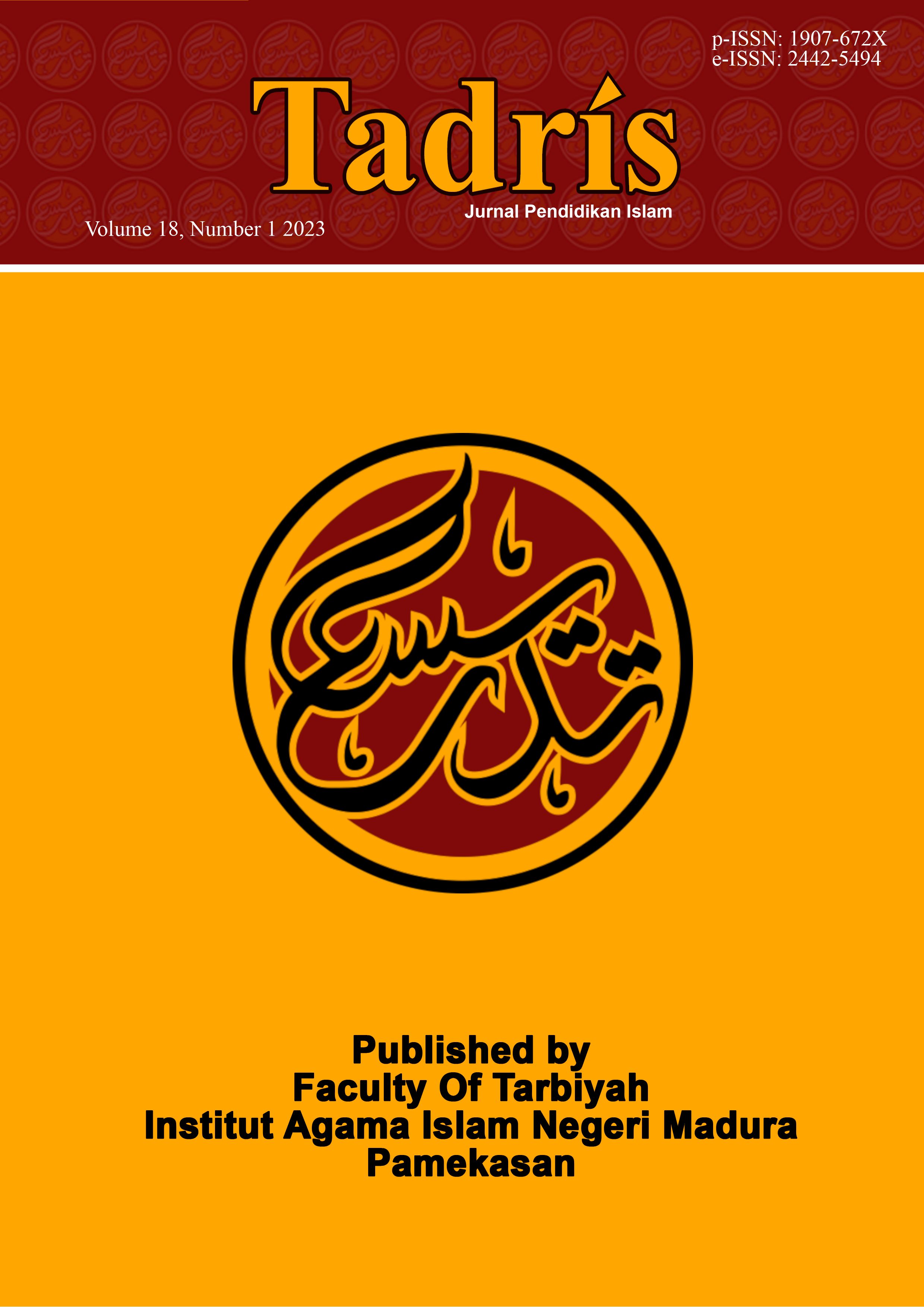Religious Digital Literacy of Islamic Education Students at Indonesia State Islamic University
 Abstract views: 244
,
Abstract views: 244
,
 PDF downloads: 263
PDF downloads: 263
Abstract
Nowadays, most campuses use the internet for their learning process. Students may search the Internet for literature or information related to the lectures. This phenomenon has an impact on students' behavior in studying religion through the Internet. This phenomenon raises worries because not a few students surf in cyberspace and try to look for information related to religious issues without any further explanation. Furthermore, they did not check the validity of the information. This paper aims to describe and analyze students’ ability in religious digital literacy. The sources come from Islamic religious students at some State Islamic University under the Ministry of Religious Affairs. This is mix-method research with explanatory sequential. In collecting data, the researcher used questionnaires and interviews. Data analysis techniques were performed with descriptive quantitative analysis and qualitative analysis. This research shows that from eight components of digital literacy, including components of functional skills and beyond ability students of Islamic religious education in the "excellent" category, the component of creativity in the "good" category, components of collaboration in the "good" category, components effective communication in the "good" category, components the ability to find and select information in the "good" category, components of critical thinking and evaluation in the "good" category, components of cultural and social understanding in the "good" category, and components e-safety in "good" category. The kindly whole from every component from such digital literacy, then religious digital literacy of students of Islamic religious education is at an interval value of 4.0 who enter in the "good" category.
Downloads
References
Asosiasi Penyelenggara Jasa Internet Indonesia (APJII) Bekerja Sama dengan Indonesia Survey Center, Laporan Survey Internet APJII 2019-2020 (Q2).
Astuti, Yanti Dwi “Digital Literacy Competence Of Indonesian Lecturers On Analysis Hoax In Social Media, Library Philosophy and Practice (e-journal). 5234 .
Baron, Robert J., Digital Literacy, The International Encyclopedia of Media Literacy, 2019.
Buckingham, David. “Defining Digital Literacy What Young People Need To Know About Digital Media,” n.d.
D. Yazon, Alberto, Karen Ang-Manaig, Chester Alexis C. Buama, and John Frederick B. Tesoro. “Digital Literacy, Digital Competence and Research Productivity of Educators.” Universal Journal of Educational Research 7, no. 8 (August 2019): 1734–43. https://doi.org/10.13189/ujer.2019.070812.
Marzuki, Mabrur Dan Angga. “Literasi Digital: Sumber Paham Keagamaan Pada Mahasiswa Penghafal Al-Qur’an Di Ptiq Jakarta.” PENAMAS 33, no. 1 (2020): 77–94.
Nugroho, Catur, and Kharisma Nasionalita. “Digital Literacy Index of Teenagers in Indonesia.” Journal Pekommas 5, no. 2 (October 19, 2020): 215. https://doi.org/10.30818/jpkm.2020.2050210.
Nur, Mahmudah. “Literasi Digital Keagamaan Aktivis Organisasi Keagamaan Di Madrasah Aliyah Negeri (Man) Di Kota Bandung.” Jurnal SMART (Studi Masyarakat, Religi, dan Tradisi) 5, no. 1 (June 27, 2019): 1–14. https://doi.org/10.18784/smart.v5i1.745.
Pertiwi, Untari Gunta, and Bachrudin Musthafa. “University Students’ Digital Literacy Competence: A Case Study with Learning Management System.” Bandung, Indonesia, 2021. https://doi.org/10.2991/assehr.k.210427.094.
Prihatini, Millenia, and Abdul Muhid. “Literasi Digital terhadap Perilaku Penggunaan Internet Berkonten Islam di Kalangan Remaja Muslim Kota.” Journal An-Nafs: Kajian Penelitian Psikologi 6, no. 1 (May 24, 2021): 23–40. https://doi.org/10.33367/psi.v6i1.1307.
Ramdhani, Rizki et.al. Perilaku Literasi Digital Keagamaan Mahasiswa UIN Sunan Ampel Surabaya, Jurnal Smart, Vol. 7 No.2, 2021.
Sabrina, Anisa Rizki. “Literasi Digital Sebagai Upaya Preventif Menanggulangi Hoax.” Communicare: Journal of Communication Studies 5, no. 2 (January 16, 2019): 31. https://doi.org/10.37535/101005220183.
Santos, Ana Isabel, and Sandro Serpa. “The Importance of Promoting Digital Literacy in Higher Education.” International Journal of Social Science Studies 5, no. 6 (May 24, 2017): 90. https://doi.org/10.11114/ijsss.v5i6.2330.
Saputra, Hendra Nelva, and Salim Salim. “Potret Sikap Mahasiswa Dalam Penggunaan Literasi Digital.” Jurnal Komunikasi Pendidikan 4, no. 2 (July 30, 2020): 94. https://doi.org/10.32585/jkp.v4i2.667.
Sholihah, Aas Siti et.al., Penguatan Profesionalisme Guru dalam Mengembangkan Literasi Digital Keagamaan (Studi di SMP Islamic School Al-Bayan Jakarta), Edukasi Islami, Vol. 11, No. 1, (2022).
Silvana, Hana, and Cecep Darmawan. “Pendidikan Literasi Digital Di Kalangan Usia Muda Di Kota Bandung.” PEDAGOGIA 16, no. 2 (August 20, 2018): 146. https://doi.org/10.17509/pdgia.v16i2.11327.
Spires, Hiller A. dan Mellisa E. Bartleet, (2012), Digital Literacies and Learning: Designing a Path Forward, Friday Institut for Educational Innovation.
Spires, Hiller A. et.al., Digital Literacy for the 21st Century, IGI Global.
Sugiono. Metode Penelitian Kuantitatif, Kualitatif, dan R&D, Cet. Ke-23, Bandung: Alfabeta. (2016).
Syarifudin, Acep dkk. tt. Kecakapan Literasi Digital Indonesia, Kementerian Pendidikan dan Kebudayaan.
The American Library Association’s (ALA) Digital Literacy Task Force. (2013). Digital Literacy, Libraries and Public Policy.
Tim Gerakan Literasi Nasional. Materi Pendukung Literasi Digital. Kementerian Pendidikan dan Kebudayaan. Jakarta.
Tsaniyah, Naimatus dan Kannisa Ayu Juliana. (2019) Literasi Digital Sebagai Upaya Menangkal Hoaks di Era Disrupsi. Al-Balagh, Vol. 4 No. 1, 122-140.
UNESCO. A Global Framework for Reference on Digital Literacy Skills for Indicator 4.4.2. UNESCO for Institute Statistic, Canada. (2018).
UNICEF Digital Literacy for Children: Exploring Definition and Framework, UNICEF, USA. (2019).
Copyright (c) 2023 TADRIS: Jurnal Pendidikan Islam

This work is licensed under a Creative Commons Attribution-NonCommercial 4.0 International License.
The journal operates an Open Access policy under a Creative Commons Non-Commercial 4.0 International license. Authors who publish with this journal agree to the following terms:
- Authors retain copyright and grant the journal right of first publication with the work simultaneously licensed under a
 Commons Attribution-NonCommercial 4.0 International License
Commons Attribution-NonCommercial 4.0 International Licensethat allows others to share — copy and redistribute the material in any medium or format, and adapt — remix, transform, and build upon the material.
- Authors are able to enter into separate, additional contractual arrangements for the non-exclusive distribution of the journal's published version of the work (e.g., post it to an institutional repository or publish it in a book), with an acknowledgement of its initial publication in this journal.
- Authors are permitted and encouraged to post their work online (e.g., in institutional repositories or on their website) prior to and during the submission process, as it can lead to productive exchanges, as well as earlier and greater citation of published work (see The Effect of Open Access).














